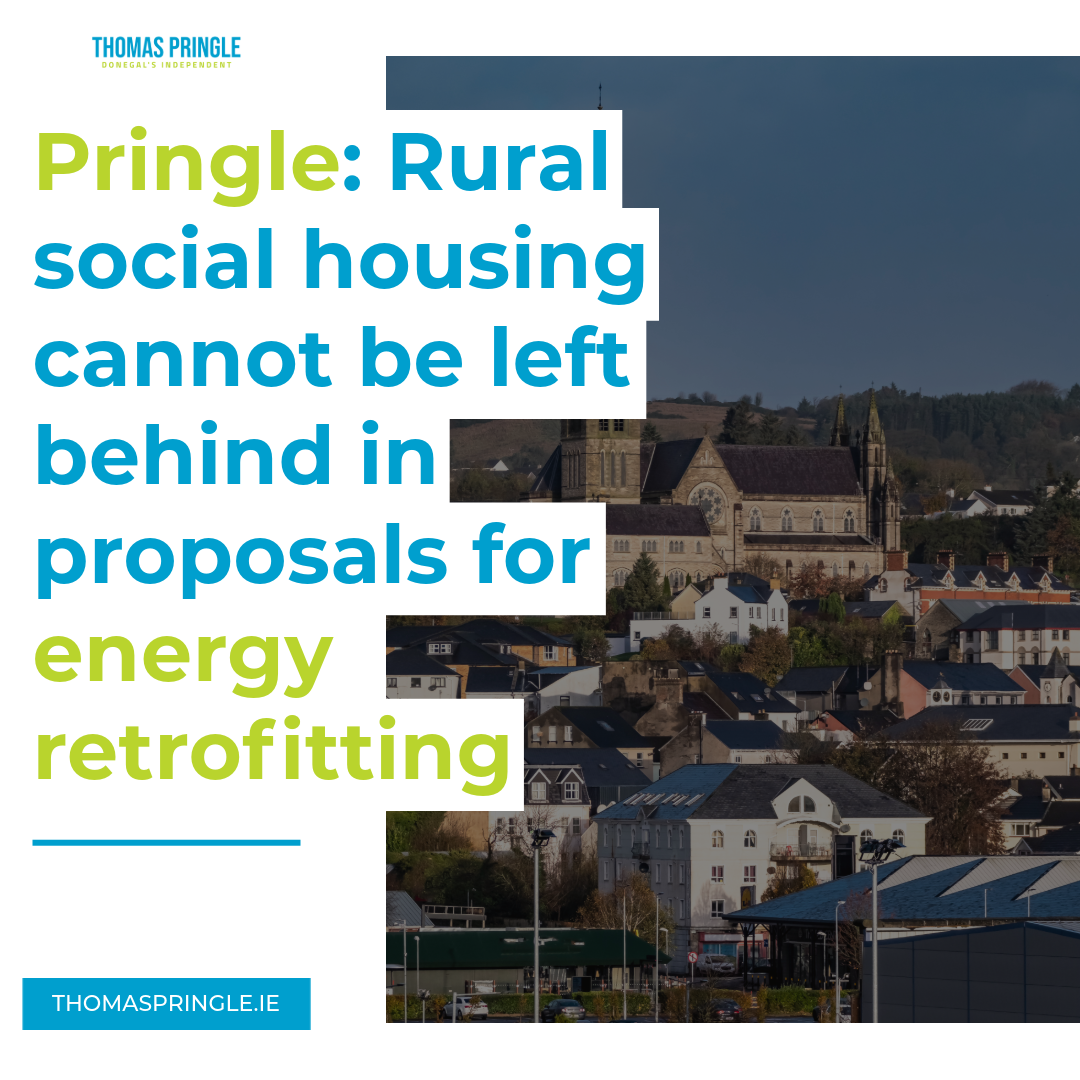- Pringle: We need a policy that recognises the importance of inshore fishing
- Pringle: Disabled people and carers face crisis of State neglect
- Pringle: Failed FF/FG housing policies forcing people to put their lives on hold
- Pringle welcomes Donegal council motion on Occupied Territories Bill: ‘We cannot stand by in the face of genocide’
Pringle: Rural social housing cannot be left behind in proposals for energy retrofitting
- Updated: 29th May 2024

Independent TD for Donegal, Thomas Pringle, said rural social housing cannot be forgotten in proposals for social housing energy retrofitting.
The deputy also emphasised the need for affordable, sustainable energy for rural Ireland to be part of Government plans for a just transition.
Addressing the Dáil on Tuesday evening, Deputy Pringle said: “Although there is no doubt that significant refurbishments are required in inner city dwellings, there are many rural dwellings that also require significant funding and refurbishments and this motion fails to address this in any way.
“I have been contacted by many constituents living in social housing that is not fit for purpose, some in horrendous condition. Many are forced to wait long periods of time before the council is able to fix or find suitable alternatives for people. In Donegal, this is made even harder by the fact that hundreds of houses across the county are affected by defective blocks,” he said.
The deputy was speaking on the Sinn Féin motion re Local Authority Housing Maintenance and Repair. He said: “I support this motion and its calls to significantly increase the funding for the social housing retrofitting programme to improve energy efficiency and reduce energy poverty. However I notice that this motion completely lacks a rural aspect, which is very disappointing.”
Deputy Pringle said: “Everyone has a right to feel safe, comfortable and warm in their own home, but many are deprived of this and many more struggle to heat their homes with continuous hikes in fuel costs as well.
“There is no doubt that we need to transition to a zero-carbon economy to ensure a better future and a better quality of life for everyone across the world. However, it is understandable that people, particularly those who are struggling to make ends meet, are apprehensive about this.
“This is because the average citizen is often expected to take the biggest hit for this transition. This is extremely unfair and completely unjust. I have called on the government, many times, to ensure that we are moving towards a just transition. However, this is not what has been happening.
“Rural Ireland gets a bad rep for not caring about the environment when nothing could be further from the truth. Many in rural Ireland work directly with the land and the sea and care very much about the well-being of the planet. But many are also just trying to make ends meet,” he said.
The deputy said: “For many in rural Ireland, cutting turf is a cost-effective way of providing a source of heat and cooking for their homes and an income for some people as well. Anyone who spends a day in the bog will tell you of the amount of work that goes into this. There is a reason that people across rural Ireland engage in this intense and heavy work for days at a time. Because the alternatives were unaffordable.”
Deputy Pringle said: “It seems that the government has a real lack of understanding of this. Although I do recognise the need to ban turf-cutting, this heat source and income source was never replaced. Instead, people are being forced to pay significantly for retrofitting and the ongoing cost of electricity that it brings.
“Government grants, like many of its grants across housing, are limited to those who can already afford the costs. And this is difficult for a just transition as well. The energy transition process in rural Ireland has been overwhelmingly negative. And the Government wonders why they are so against climate policies,” he said.
The deputy said: “People should be supported and funding should be provided to make the necessary energy changes to their homes. The Government has a particular responsibility to ensure, through funding for local authorities, that those living in social housing have good quality homes.
“It is also important that a core policy of the government is to guarantee access to affordable, sustainable energy. That would be achieved simply, I believe, by breaking the pricing link of electricity to gas prices and make it more realistic, and then we would see embracing of renewables for people right across the country,” he said.



